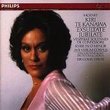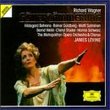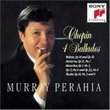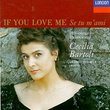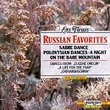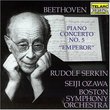| All Artists: Richard Wagner, Fritz Reiner, London Philarmonic Prchestra, Kirsten Flagstad, Lauritz Melchior, Sabine Kalter, Chorus of the Royal Opera Covent Garden, Herbert Janssen, Frank Sale, Emmanuel List Title: Wagner: Tristan und Isolde Members Wishing: 0 Total Copies: 0 Label: Naxos Original Release Date: 1/1/1936 Re-Release Date: 11/14/2000 Album Type: Box set Genre: Classical Styles: Opera & Classical Vocal, Historical Periods, Modern, 20th, & 21st Century Number of Discs: 3 SwapaCD Credits: 3 UPC: 636943106822 |
Search - Richard Wagner, Fritz Reiner, London Philarmonic Prchestra :: Wagner: Tristan und Isolde
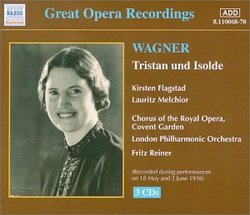 | Richard Wagner, Fritz Reiner, London Philarmonic Prchestra Wagner: Tristan und Isolde Genre: Classical
|
Larger Image |
CD DetailsSimilarly Requested CDs |
CD ReviewsA priceless record of peerless Wagner singing cdsullivan@massed.net | Cambridge, MA USA | 01/14/2001 (5 out of 5 stars) "This is a live recording made by HMV at Covent Garden in 1936, and has been unavailable for far too long. This super-bargain Naxos reissue does wonders to the mediocre sound, lessening tape-hiss and lending extra clarity that does justice to the splendors of the performance. The only serious sonic drawback is that the whole thing is taped at a very low dymanic level, so it must be played at high volume to be fully appreciated. The performance, though, is in a class of its own.Kirsten Flagstad is recorded here a year after she hit the international scene, and it is an overwhelming experience to hear her radiant voice in its prime. By the time she recorded Isolde for Furtwängler in 1952, she was fifty-seven, and past her prime: her voice had acquired a rather harsh, mettalic edge, and the higher notes came with effort. Here, though, she is truly great: as with the greatest singers, her voice is solid at the core but has a soft-toned, beautiful edge. The color of the voice is quite extraordinary, but probably the most overwhelming thing about Flagstad's voice is its security and effortlessness. She makes herself clearly heard over one hundred instrumentalists, and does it in a way that makes falling off a log seem difficult in comparison. As to her acting skills - I can't understand people's criticisms. Surely it makes more sense to portray Isolde as a dark, brooding princess in Act I than portray her as a psychotic sorceress out for revenge! All the emotion is there in the music and in her voice: she doesn't have to exaggerate or go over the top.As difficult a role as Isolde is, Tristan is probably even more challenging. But here, Tristan is sung by Lauritz Melchior, the greatest Heldentenor who ever lived. Melchior survives the impossibly long role to sing extraordinarily beautifully and powerfully in the taxing closing pages of his role, and elsewhere, he is just as magnificent. The baritonal timbre of his lower register combined with his free, radiant top, is about as ideal as it gets, and furthermore, there is not even the faintest suspicion of a wobble or a beat. He has excellent poetic instincts, as well. His delivery of the climactic line in Act III, "Wie? Hör' ich das Licht? Die Leuchte, ha!" is unforgettable, and capped by a magnificent high A. He has no rivals on record, surpassing even Suthaus's musicianship and eloquence for Furtwängler, and Vickers's harrowing portrayal for Karajan.Flagstad and Melchior, fortunately, have excellent colleagues to support them on stage and in the pit. Sabine Kalter is a magnificent Brangäne, encompassing the higher reaches of the role easily and singing with firm, beautiful tone and a model legato. Herbert Janssen is an excellent Kurwenal, with well-focused, dark tone, and Emanuel List is a dark-toned, poetic Marke. The London Philharmonic plays beautifully, with particularly fine playing from the strings, under the direction of Fritz Reiner. Reiner's speeds are quite fast, but he makes them work through sheer conviction, as, for instance Böhm for DG can't do. The other supporting roles are generally well taken. The only musical drawback is that sections of the last two acts are cut: about ten to fifteen minutes are missing from Act II, and about fifteen minutes from Act III. Taking into account the less than ideal sound, the cuts, and Reiner's unrevelatory direction, I would not recommend this as the only recording of "Tristan" for your library. Furtwängler's peerless reading of the score can be heard on EMI, with an older Flagstad and an intelligent but taxed Tristan in Suthaus; Böhm's 1966 Bayreuth set is dramatically compelling but totally misses out on the luscious beauty of this work; EMI's 1970 set has Vickers's overwhelming Tristan and the gorgeous Berlin Philharmonic - in addition to Dernesch's weak Isolde and uninvolved conducting from Karajan. My recommendation for your first recording of this massive work depends on your capacity for mediocre sound. If you must have modern sound, get the Böhm. If you can take mono sound, get Furtwängler's EMI set. But this Reiner version is really the only well sung "Tristan" in the catalogue. You haven't heard "Tristan und Isolde" until you've heard Flagstad and Melchior singing their hearts out." Perfect Erik Aleksander Moe | Oslo, Norway | 03/28/2001 (5 out of 5 stars) "Before buying this recording, I only had the EMI version with Furtwaengler and Suthaus that had Flagstad before. I thought she was brilliant in that recording. Hearing her again here in a performace from 18th May 1936 in Covent Garden in London left me stunned. I had been wanting this performance for quite some time now ..., but then I heard that Naxos Historical was going to release it. So I waited. And the wait definitely worth it.Having also heard Melchior in the role of Tristan in the performance from 1943, also released by Naxos Historical, and I was thrilled that he was even better here, 7 years earlier.What put me off on the EMI recording were the Brangaene and Marke. I am by no means a fan of Josef Greindl and found his Marke too gritty (I think Greindl is always too gritty). The mezzo who sang Brangaene (I forgot her name) was ok, but nothing else. But Sabine Kalter and Emanuel List, one of the greatest bassos ever, were both so remarkable.But the stars are Flagstad and Melchior, both singing such movingly, hauntingly beautifully and securly throughout the whole opera.Reiner's conducting is also extremely good. He has just the right timing and the orchestra also plays beautifully.Finally the sound. The sound is also remarkable. The sound is of course noisy (it is a live recording fra 1936), but still is it extremely clear. You hear what is being sung at all times with no distortion in the voices, even when they sing at the highest, which is a normal problem for recordings from that aera.Again, like the heading says, it is perfect. All the stars sing at their best and deliver the best performance one is likely to hear anywhere anytime." You can't beat the singing Philip May | Houston, Texas | 02/26/2003 (5 out of 5 stars) "This version on Tristan and Isolde is one of two versions currently available with Kirsten Flagstad and Lauritz Melchior. That Melchior is the top Heldentenor of all time is undisputed. Flagstad is considered one of the greatest Wagnerian sopranos ever. To many, myself included, hers is the "voice of the century". Fritz Reiner, who later in life made the Chicago Symphony Orchestra one of the world's best ensembles, is quite good here. The London Philharmonic players handle the music well, though the 1936 recording doesn't do them justice. The rest of the cast is wonderful, all first rate Wagnerians - this is quite simply the best singing you will ever hear of this opera. If you want to be swept away by the sound of the orchestra, then a more modern recording, say Kleiber or Karajan, is for you. If you value the interpretation over all else, Furtwangler is the best, and a 57 year old Flagstad is still superior to all but a younger Flagstad. But to hear the best singing ever, Flagstad and Melchior in their primes is absolutely unbeatable.
As for the reviewer who strongly favored the Beecham recording - he should check the liner notes. Most of acts I and III on the "Beecham" recording is actually this Reiner performance. Many of the original 78s for the Beecham performance have been lost, so EMI filled the gaps with Reiner. That said, this pressing by Naxos brings the voices out much better than the EMI pressing. Recording engineer Ward Marston is truly a marvel. I should also mention that there are potentially better Tristan recordings of Flagstad/Melchior out there. The Metropolitan Opera broadcast nine out of the sixty-seven times the pair sung it at the Met between 1935 and 1941. None of these have been released, but the tapes are sitting there. Perhaps someday Naxos or some other label that restores classic performances will get access to the Met archives and give us an even better performance." |

 Track Listings (7) - Disc #1
Track Listings (7) - Disc #1

